In the messaging channels of the Telegram platform, where Belarusian migrants communicate, Nasha Niva journalists noticed suspicious job advertisements.
The attention of journalists was drawn to the fact that the ads do not mention what needs to be done – only it is written that the work is remote, the approximate amount of money is indicated and it is suggested to provide more details in a personal message.
Upon contact with one such “employer”he immediately introduced himself as an intermediary, without specifying from whom he receives orders – he only said that he receives a lot of them.
“Naša Niva” photo/”Naša Niva” journalists’ correspondence with the “customer” of the provocations
The first proposal was to photograph people visiting Belarusian events and demonstrations in Vilnius. The reward will be transferred in cryptocurrency.
The “Customer” mentions that “on the 25th, Belarusians gathered. Photos were also needed.”
You probably mean March 25 in Vilnius the mentioned day of freedom of Belarus.
Lukas Balandis/BNS photo/Belarusian Independence Day celebration in Vilnius
He asked to photograph the VSD building
The mediator asked if breaking the law, such as painting graffiti, would be a problem.

“Naša Niva” photo/”Naša Niva” journalists’ correspondence with the “customer” of the provocations
Next, a test task was sent: to photograph the parking lot at the Department of State Security (VSD). The photo should show the car numbers.
The “customer” sent a photo of the map where the VSD building was marked. Street names were listed in Polish. He said he didn’t know what kind of building it was, he just pressed to accept the “order”.
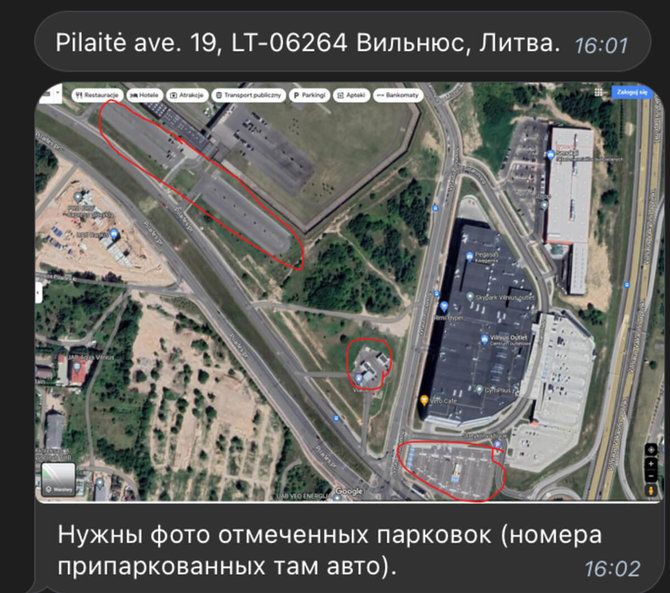
“Naša Niva” photo/”Naša Niva” journalists’ correspondence with the “customer” of the provocations
From this, the journalists guessed that they may have communicated with a Belarusian or Russian agent who joined from Poland.
The conversation was held in Russian. The mediator was not able to answer the questions in Lithuanian or Gudu languages.
Similar ads, as the journalists noticed, regularly appear in Vilnius’ Russian-speaking messaging channels on the Telegram platform.
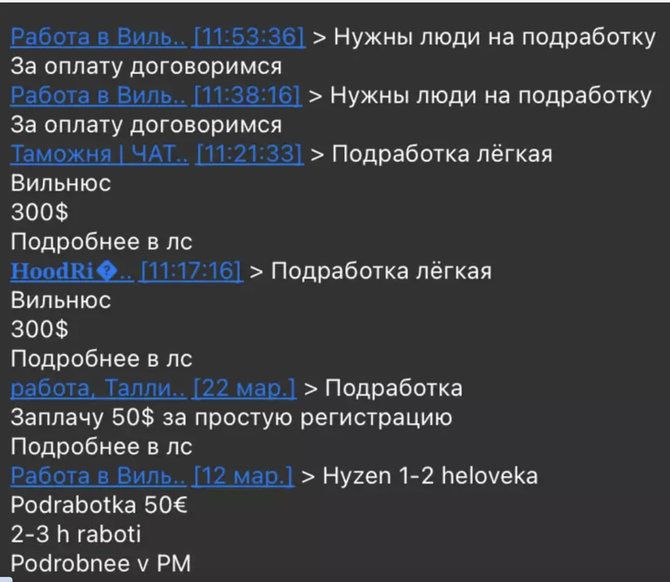
“Naša Niva” photo/”Naša Niva” journalists’ correspondence with the “customer” of the provocations
A serious signal
Commenting on this study, the researcher of the Institute of International Relations and Political Sciences (VU TSPMI) dr. Nerijus Maliukevičius said that preparing provocations against our country using social networks is a serious signal.
“This is a serious qualitative change from both the Russian and Belarusian special services. And it is conditioned by several important factors: first of all, in the West and in our country, serious measures were taken to block the intelligence network and its activities were significantly limited.
Hence, they started looking for new ways and those ways became virtual. Modern technologies allow them to be used for various purposes. In one case, it was an intelligence activity, but now we see that it is possible to organize provocations at a distance,” explained the specialist.
According to N. Maliukevičius, the problem is not completely new – Western countries have been facing similar challenges for some time, only there they are talking about the extremist network created by Daesh (Islamic State).
“We should pay attention to this, perhaps strengthen counter-intelligence, monitor social networks more closely,” added N. Maliukevičius.
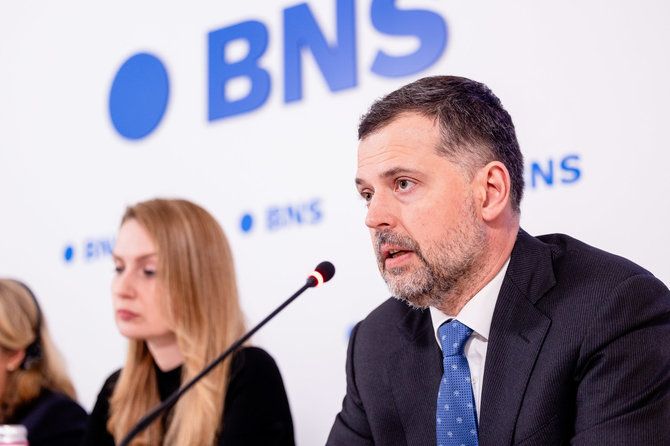
Lukas Balandis/BNS photo/Nerijus Maliukevičius
There are many possibilities
Vytis Jurkonis, the head of the organization “Freedom house” in Lithuania, considered that such “job offers” could have several purposes.
“Of course, the first conclusion is that the Moscow and Minsk agencies are behind this, because the activity in the Internet space is not so obvious, sometimes even less noticeable.
Another thing, it could be done by testing how our institutions respond. And such “work” could be a prelude to wider activities.
This behavior may also be aimed at causing panic and suspicion in certain sections of the population,” the expert assessed.
V. Jurkonis emphasized that the Russian-speaking audience is not very exclusive – Lithuanian and English-speaking people probably receive such “offers”.
When asked to assess the extent to which such “tasks” may change in the future, or even become violent, remembering the recent attack on oppositionist Leonidas Volkov in Vilnius, V. Jurkonis said that such a possibility cannot be ruled out.
“Testing is underway, but it is necessary to understand that, for example, graffiti can be drawn or photographed by people of any age or physical ability, with different experiences. However, some jobs are too specific, so it is much easier to choose to work through criminal networks,” the expert assessed.
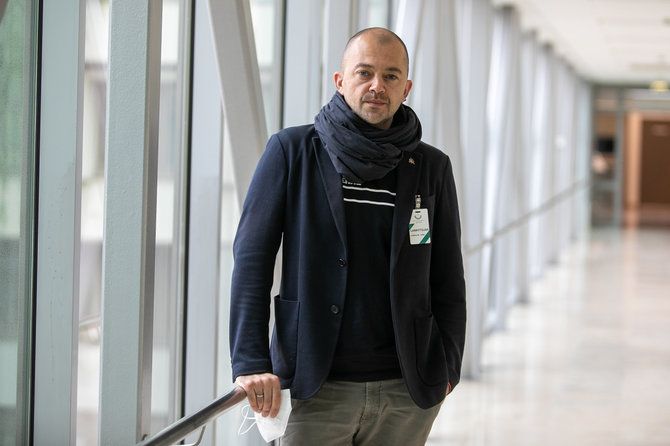
Julius Kalinskas / 15min photo / Vytis Jurkonis
V. Jurkonis emphasized that job seekers should evaluate the situation more critically, and if they fall into a trap, they should not be afraid to report it.
“The most important thing is that people living in a democratic state – Lithuania – should not be afraid to tell their colleagues, friends, state institutions that a similar situation has happened. Because in silence, in that silence, the actors of the regime stand out much better and can cause much more damage,” warned V. Jurkonis.
The situation is known
According to the VSD, the situation is known to the country’s services and is not new.
“In the past year, a number of cases were revealed when persons connected with the intelligence services of hostile countries searched for residents of European countries on social networks who would agree to spy, carry out acts of sabotage or vandalism for a fee. It is almost certain that such activities are continued to this day,” the comment states.
The department urges you to report immediately if you see advertisements on social networks that offer financial compensation for committing violations of the law in Lithuania.
It can be done here.
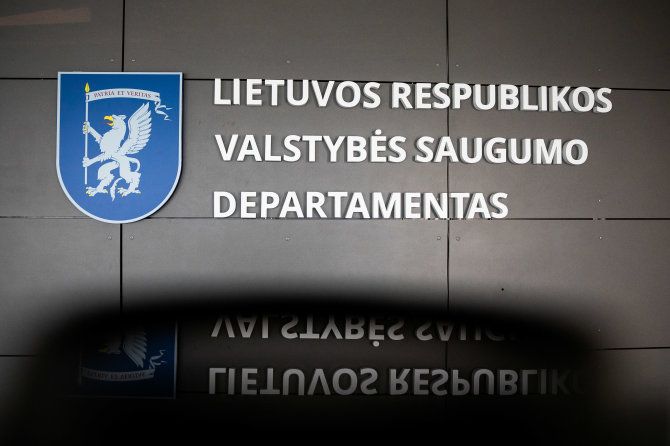
Žygimantas Gedvilas/BNS photo/Department of State Security
A wave of provocations
On March 20, the Belarusian graffiti “Vilnia naša” (Vilnius is ours) appeared on the sign marking the entrance to Vilnius, and below it the flag of independent Belarus.
That case caused indignation of Lithuanian society towards Belarusians. As a news portal TV3.lt stated Gintaras Leperskas, the representative of the Vilnius Municipality, this type of writing is a phenomenon that has increased significantly recently.
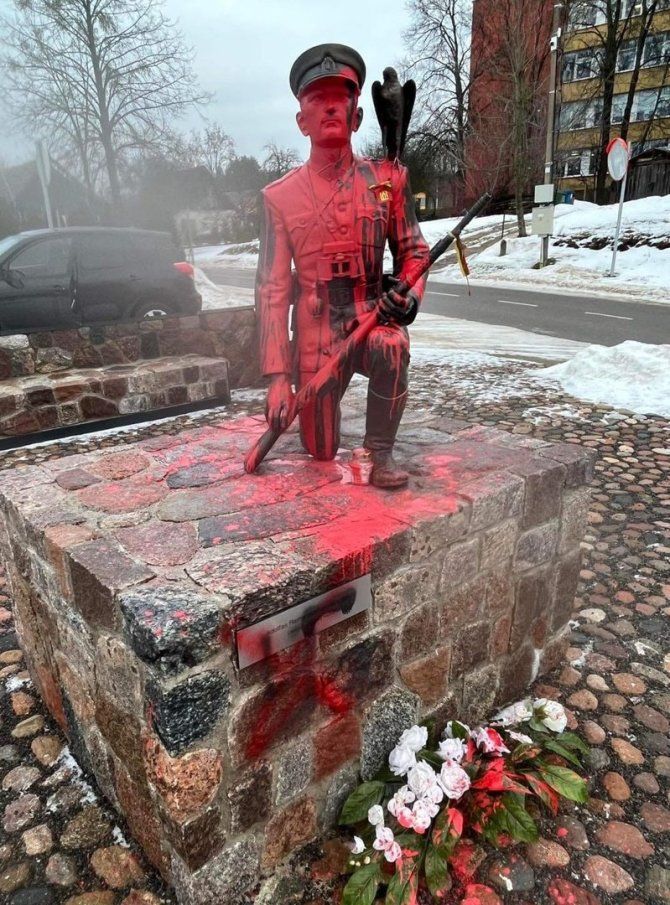
Photo of the Merkinė Regional Museum/The monument to A.Ramanauskas-Vanagas in Merkinė covered with paint again
It reminded me of another famous case of vandalism – red paint at the end of January this year the monument was poured to the partisan leader Adolfis Ramanauskas-Vanagas. The same incident was recorded last May.
How then announced Latvian media, based on information released by the State Security Service of Latvia (VDD), a man suspected of this was arrested at the border point between Latvia and Belarus on February 8.
He is suspected of having carried out a similar attack in Latvia, where he painted over a memorial stone to Latvian soldiers who fought against the Soviet army during the Second World War.
An investigation has been launched against him for helping Russian services to act against Latvia.
VSD warnsthat states hostile to Lithuania are organizing psychological and informational attacks aimed at creating panic in the country’s society.
This is done under the guise of Litvinism, thus trying to discredit the Belarusian democratic opposition and pit Lithuanian citizens against Belarusians living in the country.
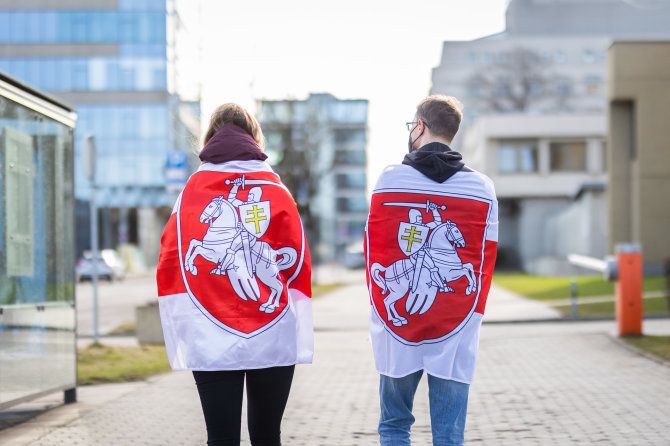
Lukas Balandis/BNS photo/Belarusian Independence Day celebration in Vilnius
Global trend
Similar cases of Russia using acts of vandalism to create or escalate inter-communal conflicts are well known from past practice.
October 23 They were arrested in Paris 4 persons from Moldova who painted the stars of David on the city walls, as the investigation showed, did so at the behest of Russia.
Obviously, in this way, Russia tried to intensify the conflict between the Jewish and Arab communities in France by exploiting the war between HAMAS and Israel.
https://twitter.com/maximeaudinet/status/1722167371165573404?s=20 According to Maximo Audinet of the Institute for Strategic Studies under the French Ministry of Defense, the KGB organized similar companies as far back as the 1950s, using anti-Semitic slogans and swastikas in West Germany to discredit the country in the eyes of the West and incite conflict between local communities.
A similar tactic was also observed in Poland, where in 2022 March 20 posters appeared about the Volhynia massacre with the slogan “Banderovci – people without honor”. Banderovac the poster was embellished with the Star of David sign.
Tags: Lithuania proposed organize provocations reward euros photo VSD building painted graffiti
-














